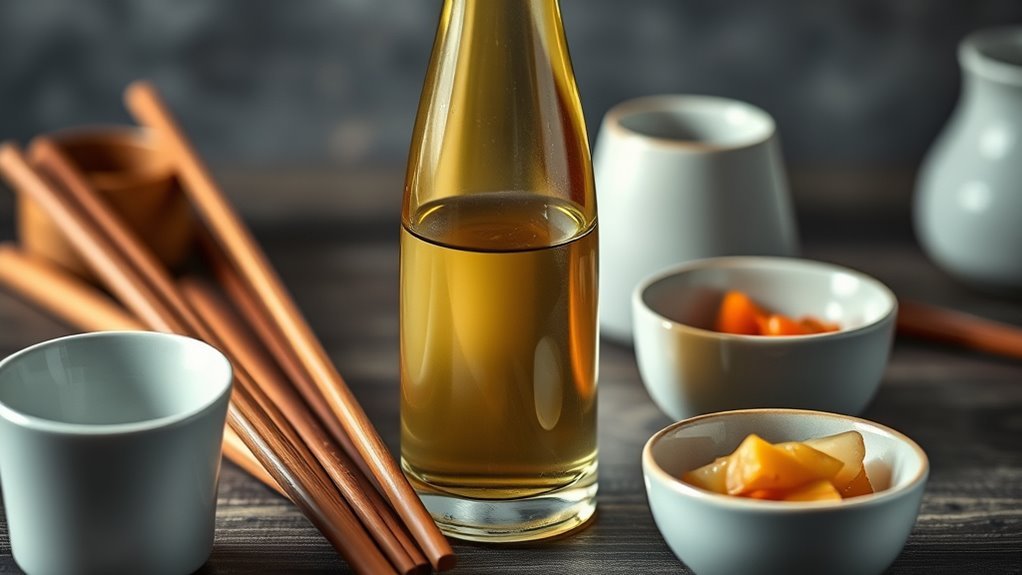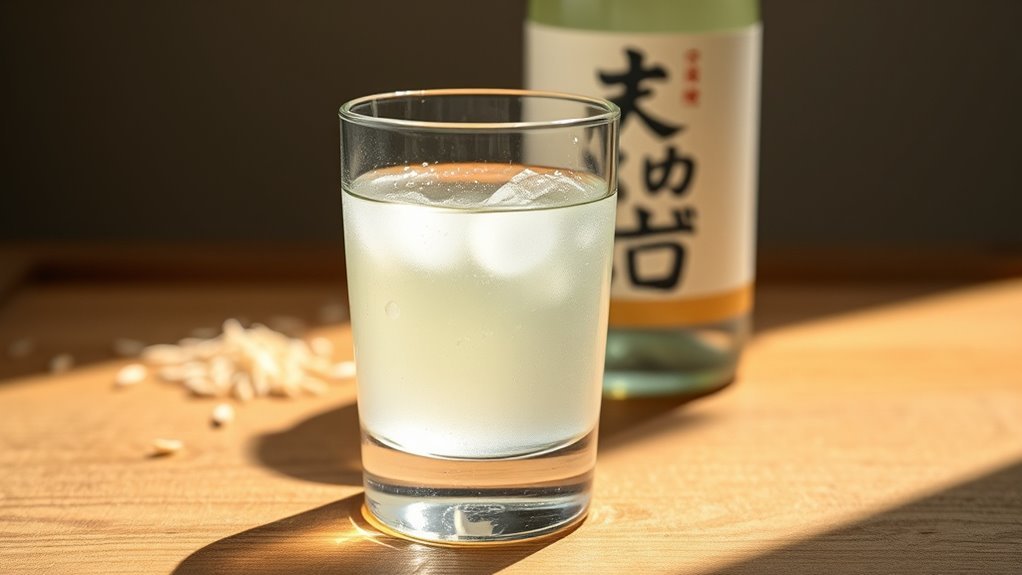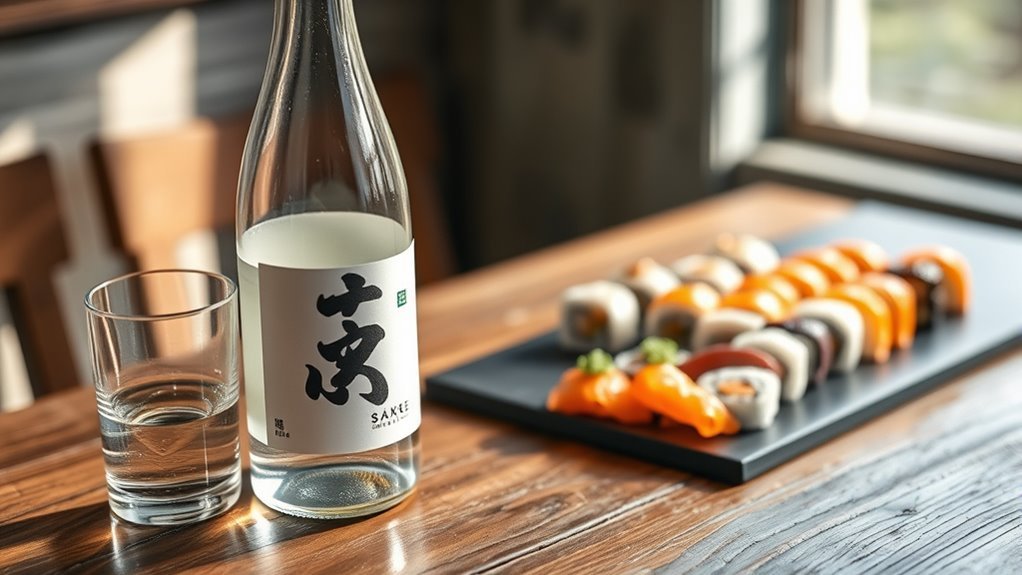Sake isn’t strictly keto-friendly due to its carbohydrate content, but you can enjoy it in moderation. Dry varieties typically have lower carbs, ranging from 0.5 to 3 grams per ounce, which can fit into a keto diet if you watch your portions carefully. Since overconsumption can hinder ketosis, it’s wise to pair sake with low-carb foods and monitor your overall intake. There’s more to contemplate about sake and its health benefits, so keep exploring your options!
Understanding the Carbohydrate Content of Sake

When you’re considering whether sake fits into your keto diet, it’s essential to understand its carbohydrate content. Sake typically contains around 4-5 grams of carbohydrates per 150 ml serving, which can impact your daily intake. The sake sweetness often comes from residual sugars that remain after fermentation, making it vital to choose varieties wisely. While sake is less carb-heavy than certain beer or sugary cocktails, it still qualifies as a carbohydrate source. If you’re aiming for strict keto compliance, moderation is key. You can enjoy sake occasionally, but be aware of how its carbohydrates fit into your overall daily limits. Balancing your choices will help you maintain the freedom of your keto lifestyle without feeling deprived.
The Brewing Process of Sake

To understand whether sake fits into your keto lifestyle, it’s essential to know how it’s made. The brewing process involves specific ingredients like rice, water, yeast, and koji mold, which all play a role in fermentation. This process also includes filtration methods that can affect the final carbohydrate content, so let’s take a closer look.
Ingredients Used in Sake
Sake, a traditional Japanese beverage, is crafted through a meticulous brewing process that relies on four key ingredients: rice, water, koji mold, and yeast. The type of rice used is essential, as certain rice types, such as Yamada Nishiki, are preferred for their high starch content and polished grains. This polishing enhances the sake’s flavor profile. Water quality is equally significant; soft water is often favored because it helps create a smoother taste. Koji mold plays an important role by converting starches into sugars, while yeast ferments these sugars into alcohol. Together, these ingredients harmonize to produce the unique and complex flavors of sake, making each brew a reflection of its environment and craftsmanship.
Fermentation and Filtration Process
The brewing process of sake involves intricate fermentation and filtration steps that greatly influence its final flavor and quality. First, various fermentation techniques are employed, including the conversion of starches in rice to sugars using koji mold. Yeast then ferments these sugars into alcohol, creating a complex flavor profile. This primary fermentation typically lasts about three weeks.
After fermentation, meticulous filtration methods come into play. Sake is often pressed to separate the liquid from the solid rice remnants. Depending on the desired clarity and flavor, additional filtration can occur, removing impurities while preserving essential characteristics. These processes are vital, as they shape the sake’s aroma, taste, and overall drinking experience, ultimately determining its compatibility with your lifestyle choices.
Different Types of Sake and Their Carb Counts

When exploring different types of sake, it’s important to evaluate their carbohydrate content, especially if you’re following a keto diet. Sake varieties can differ markedly in carb counts. For instance, Junmai sake typically contains around 0.5 to 1 gram of carbs per ounce, making it one of the more keto-friendly options. On the other hand, Daiginjo and Ginjo sake can have higher carb counts, averaging between 2 to 3 grams per ounce due to their sweeter profiles. A carb comparison of these sake types reveals that you can enjoy moderate amounts of Junmai without derailing your keto goals. Always check labels or consult with a knowledgeable source to make informed choices that align with your dietary preferences.
Comparing Sake to Other Alcoholic Beverages
Although sake offers a unique flavor profile and cultural experience, it’s essential to compare its nutritional aspects to other alcoholic beverages, especially for those on a keto diet. Sake typically contains more carbs than spirits like vodka or whiskey, making them better options for keto enthusiasts. If you’re seeking sake alternatives, consider dry wines or low-carb cocktails that contain no added sugars. These options can keep your carb intake in check while still offering a revitalizing drink. When crafting keto cocktails, opt for mixers like soda water or diet tonic to maintain low carb levels. Ultimately, while sake can be enjoyed occasionally, being mindful of your choices can help you stay aligned with your keto goals.
Potential Health Benefits of Sake
Sake offers some potential health benefits that could appeal to you. Its antioxidant properties may help combat oxidative stress, while being a low-calorie option makes it a lighter choice compared to many other alcoholic beverages. This makes sake an interesting addition to your diet, especially if you’re mindful of your calorie intake.
Antioxidant Properties
While many alcoholic beverages lack significant health benefits, the antioxidant properties of sake may surprise you. Sake antioxidants, primarily derived from rice and fermentation, offer potential health benefits that might make you reconsider your drink of choice. These compounds can help combat oxidative stress in your body, contributing to overall well-being.
- They may support heart health by reducing inflammation.
- Sake antioxidants can enhance skin health, promoting a youthful appearance.
- Drinking sake in moderation might improve your mood due to its relaxing properties.
Low-Calorie Option
When considering low-calorie alcoholic options, sake often stands out as a favorable choice. With around 100 calories per 5-ounce serving, it’s lower than many traditional cocktails. Sake’s unique fermentation process results in fewer sugars, making it a better option for those watching their caloric intake. You can enjoy sake neat or with healthy mixers like soda water or fresh citrus juice, creating delicious low-calorie cocktails without the extra sugars found in many other drinks. This makes it not only a revitalizing choice but also a versatile one for those wanting to explore different flavors without compromising their health goals. So, next time you’re out, consider sake as your go-to option for a guilt-free indulgence.
Tips for Enjoying Sake on a Keto Diet
Even if you’re following a keto diet, you can still enjoy sake by being mindful of your choices. Consider these tips to keep your sake experience enjoyable and aligned with your dietary goals:
- Choose dry sake varieties: Opt for Junmai or Honjozo, which typically have lower sugar content.
- Watch your portions: Stick to a standard serving size to manage your carbohydrate intake effectively.
- Explore keto alternatives: Pair sake with keto-friendly snacks like cheese or cured meats instead of high-carb options.
Sake Pairing Suggestions for Keto Meals
To enhance your keto dining experience, pairing sake with the right foods can elevate both flavor and enjoyment. Different sake flavor profiles complement various keto friendly appetizers perfectly. Here are some suggestions:
| Sake Type | Keto Friendly Appetizers |
|---|---|
| Junmai | Grilled chicken skewers |
| Ginjo | Avocado salad with sesame dressing |
| Daiginjo | Sashimi with low-carb dipping sauce |
| Nigori | Creamy cauliflower dip |
| Honjozo | Zucchini fritters |
Making Informed Choices at the Sushi Bar
While sushi bars can offer a delightful dining experience, maneuvering through the menu can be challenging for those on a keto diet. To make informed choices, focus on low-carb sushi selections that align with your dietary goals. Here are some tips to help you navigate:
- Opt for sashimi: Pure fish without the carbs of rice.
- Choose rolls with avocado: They add healthy fats and flavor profiles without the extra carbs.
- Skip the tempura: Fried options tend to be higher in carbohydrates.
Frequently Asked Questions
Can I Drink Sake While on a Strict Keto Diet?
When considering if you can drink sake on a strict keto diet, it’s essential to look at its carb content. Traditional sake contains around 4 grams of carbs per 1.5 ounces, which can add up quickly. If you’re looking for sake alternatives, options like dry wines or spirits mixed with low-carb mixers might be better choices. Ultimately, moderation is key, and keeping track of your total carb intake will help you maintain your keto lifestyle.
How Does Sake Affect Ketosis Compared to Other Alcoholic Drinks?
When comparing sake to other alcoholic drinks, its fermentation process results in higher sugar content, which could hinder ketosis. While it might not be the best choice for maintaining a keto diet, you can explore keto-friendly alternatives like spirits or dry wines that contain fewer carbs. If you enjoy sake, consider moderation and balance it with lower-carb options to maintain your freedom in enjoying both your diet and social experiences.
Is There a Specific Sake Variety Lowest in Carbs?
Picture yourself at a cozy Japanese bar, sipping on a delicate glass of sake. When it comes to sake types, Junmai is your best bet for the lowest carb content. This pure rice sake generally has fewer carbs compared to other varieties, making it a more keto-friendly choice. While carb counts can vary, opting for Junmai can help you enjoy sake without derailing your dietary goals. Cheers to mindful sipping!
Can Sake Trigger Cravings for High-Carb Foods?
Sake can indeed trigger cravings for high-carb foods. When you consume alcohol, your body’s metabolism shifts to prioritize breaking down the alcohol, which can lead to a temporary dip in blood sugar levels. This drop might make you crave quick energy sources, often high in carbs. If you’re mindful of your consumption, you can enjoy sake without falling into those cravings. Just remember to balance your choices afterward to maintain your goals.
What Are the Best Sake Brands for Keto Dieters?
When it comes to selecting the best sake brands for keto dieters, think of it as choosing a fine wine for a special occasion. Premium sake often offers low carb options, making it a viable choice. Brands like Dassai and Hakkaisan are known for their quality and lower sugar content. Always check the labels, as some varieties can be higher in carbs, but with a little research, you can enjoy sake without guilt!
Frequently Asked Questions about Sake and Keto
1. Is sake keto-friendly?
Sake can be considered keto-friendly in moderation. While it is made from fermented rice, which contains carbohydrates, the alcohol content in sake can lead to a lower net carb count. A typical serving of sake contains about 0.5 to 1 gram of carbs per ounce, making it a reasonable choice for those on a ketogenic diet when consumed in limited amounts.
2. How does the carb content of sake compare to other alcoholic beverages?
Compared to many other alcoholic beverages, sake is relatively low in carbohydrates. For instance, beer can contain anywhere from 10 to 20 grams of carbs per serving, while sweet wines can also be high in sugar. In contrast, dry sake typically contains fewer carbs, making it a more suitable option for those adhering to a keto lifestyle.
3. Can I drink sake on a keto diet without exceeding my carb limit?
Yes, you can enjoy sake on a keto diet by being mindful of your serving sizes. Since most keto diets recommend limiting daily carb intake to around 20-50 grams, a few ounces of sake should not significantly impact your overall carb count. Just be sure to account for the carbs from sake in your daily total and choose drier varieties to minimize carb intake.
4. What types of sake are best for a keto diet?
When selecting sake on a keto diet, opt for dry varieties such as Junmai or Ginjo. These types of sake have lower sugar content compared to sweeter styles like Nigori or Daiginjo. Always check the label for carbohydrate content if available, as this can provide a clearer idea of how the sake fits into your keto plan.
5. Are there any health benefits to drinking sake on a keto diet?
Sake contains several beneficial compounds, including amino acids, vitamins, and antioxidants. Drinking it in moderation may offer some health benefits, such as promoting heart health and providing hydration due to its lower sugar content compared to sweeter alcoholic beverages. However, it’s important to balance alcohol consumption with overall health goals and remain mindful of portion sizes.


